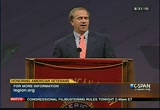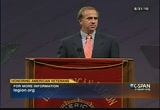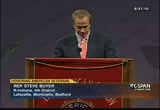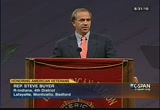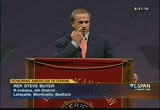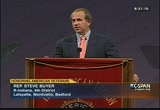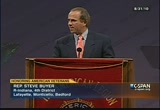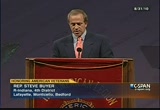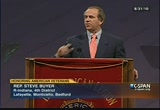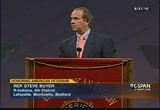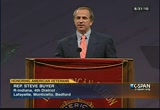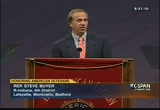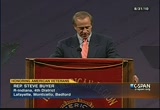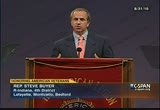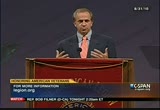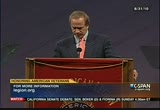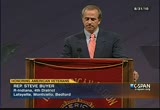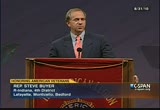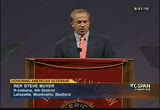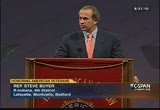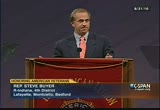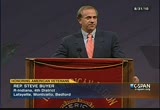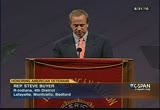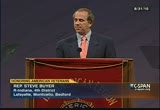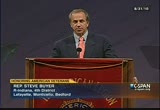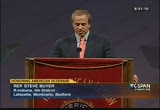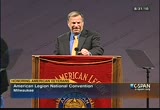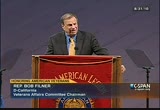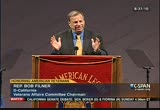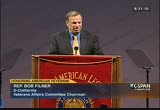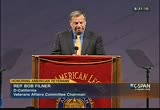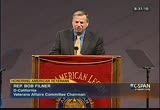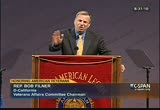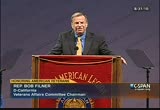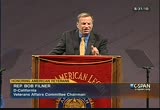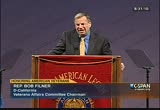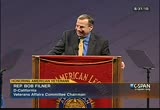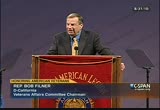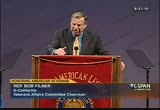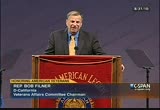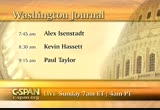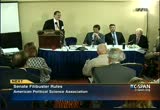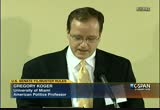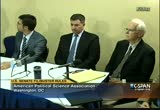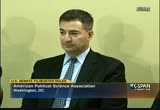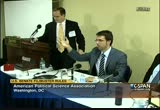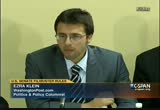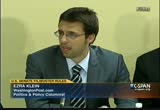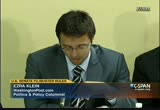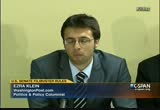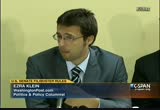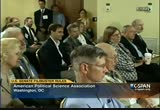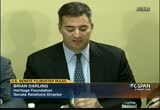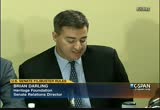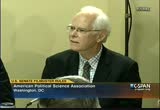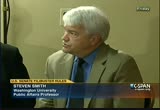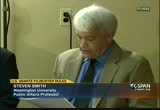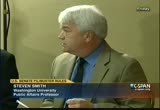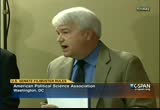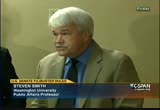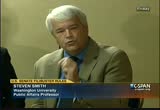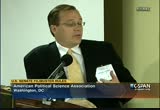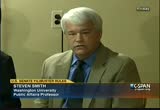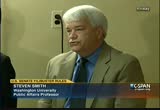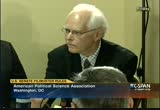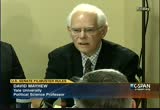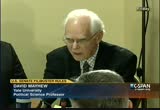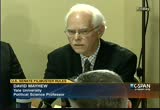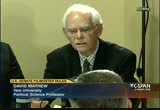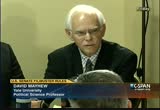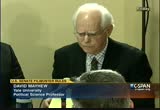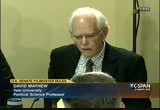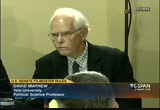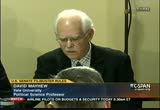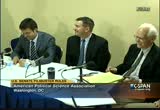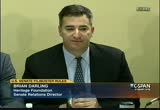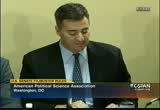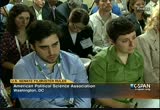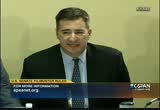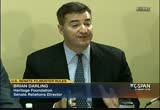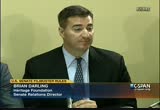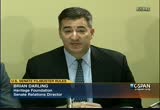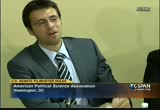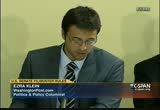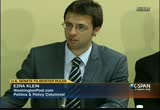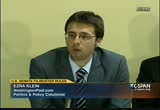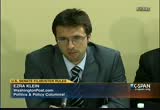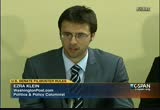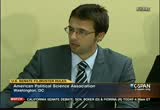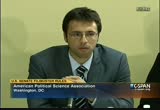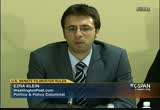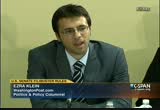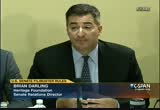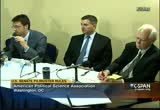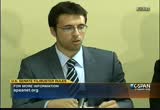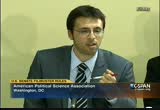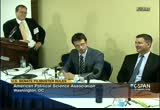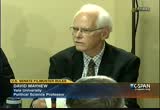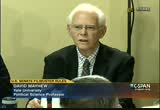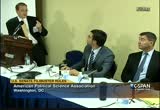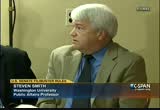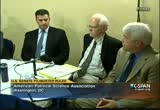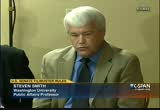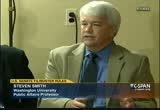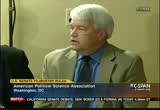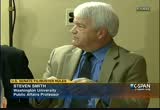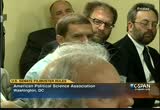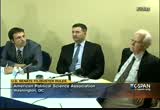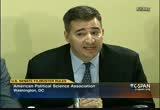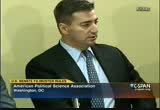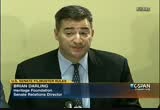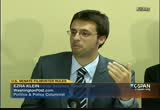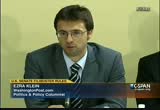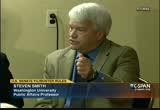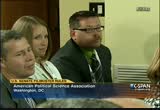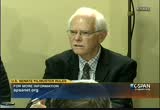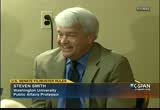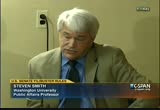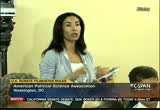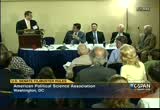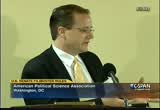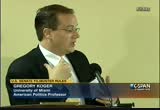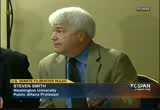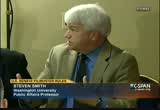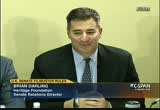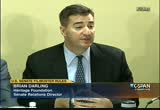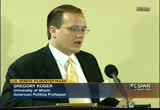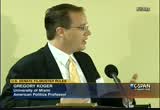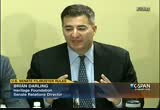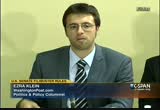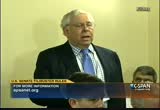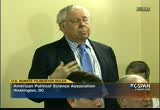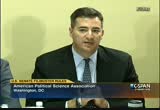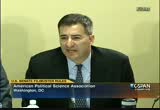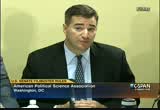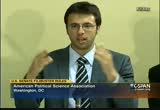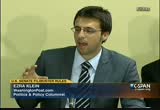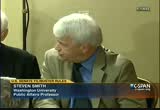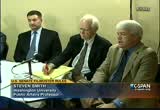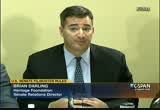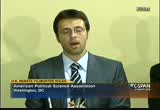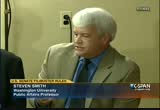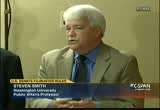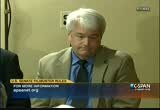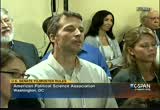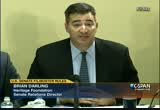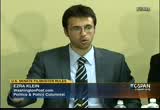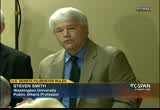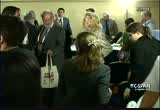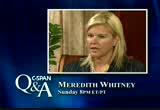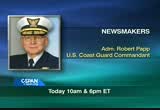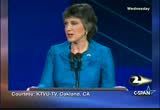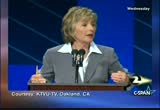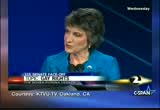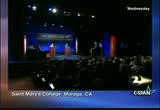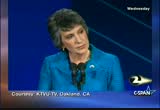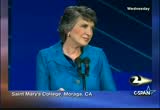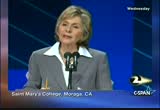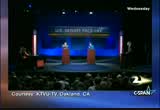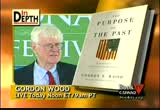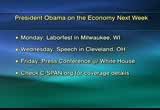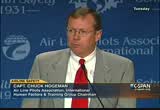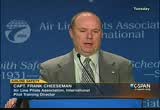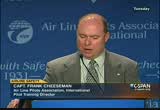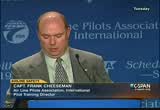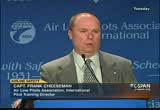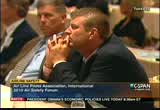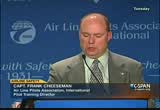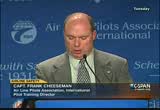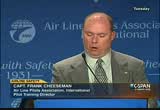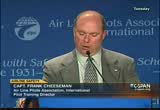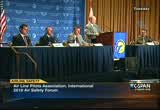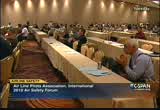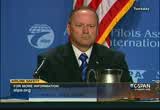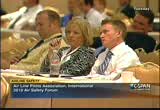tv C-SPAN Weekend CSPAN September 5, 2010 2:00am-6:00am EDT
2:00 am
that is what he did in indiana. he served as a dentist until the age of 80. then he closed his door. his goal was to work until he was 80. from the two of us putting down the river, i said, [laughter] my brother, john and i had a rare privilege coming up. it we followed our father to the citadel and john is a graduate of the citadel mighting 79 and myself of 1980. he went on to the dental corps as a dentist. we transferred to the jag cora and i have been on active duty several times. my status as a veteran has been
2:01 am
extremely helpful in my committee assignments to serve you and the nation in congress. it is really unfortunate that there are not as many veterans that serve in congress today. there are probably less than 20 of us that have served in a theatre of war and is pretty stunning. not long ago, i was able to say to john dingell that i do in the in that if god had given me the choice in military or congress, i would have chosen to serve in the congress where members have served in world war ii and korea. they understood the american character. they understood a character that was formed and forced out of the course also very difficult times, and they were task
2:02 am
through time to actually go to foreign lands, to go to places where they had never been to fight for people that have never met. the left freedom in their footsteps and left lord ones behind. they understood something very powerful. -- left glove ones behind. -- load once -- loved ones behind. how about those in congress being an american for once? [applause] for 30 years, i have had the honor to where the army uniform. for the past 18 years, i have served the people of indiana in
2:03 am
the united states congress in this nation. on september 16, my brother and i will stand in uniform in the veterans affairs committee room for a ceremony hosted by the secretary of the army and i will retire. this will complete my federal service to the nation in army uniform and the united states congress. i am grateful and humbled. it is truly a remarkable experience to serve the men and women that were the uniform for it i want to extend my appreciation to the national commanders and also my mentors. the past and to me some really great qualities and attributes -- unto me some really great qualities and attributes.
2:04 am
our concerted efforts of truly bent remarkable. when i think of what the va look like when i came in 1982, it was depicted in a movie called "born on the fourth of july." it was not a very good story to tell. the va has transformed itself in the past years and it has taken a lot of hard work and a lot of maintenance and mentor should, not only by the american legion, but other organizations and military organizations. the va has transformed itself from a health-care provider of last resort to a world-class system that we are all proud of. we provide constant maintenance as we transformed from a hospital based care model to recurrent community-based outpatient clinic that it serves our patience much more conveniently and efficiently. -- our medical patients much
2:05 am
more conveniently and efficiently. your mission is among the highest collins of the organization in our country outside of religious affiliations. this includes the mentoring and sponsorship of youth and our communities. the impact that you have upon young men and women today is very powerful. they watch what you do. when they told you, as a young soldier, to lead by example, when you took off that uniform and returned to civilian status, you continued to set the example. these programs are extremely important, especially at a time when there are pillars in our society that are weakening at its base. when the military or religious
2:06 am
organizations and private schools, when you think about what is out there that provides color and stability of america's soul, you play very important role. your advocacy for patriotism and helping tell your story so that people understand honor and service and selfless sacrifice. promoting a strong sense of well-being in our nation's security. at -- as i listened to our speaker's remarks, she was correct when she said you must first have economic security before you can have national security. it is part of the problem of why communism failed. madam speaker, you must have a complete understanding of what it means to the men and women that wear the uniform. please do not to say that you will take care of them when they come home. you cannot have a voting record when you do not support the military.
2:07 am
you can't say to your children that you do not like your behavior or what your doing, so that car, i am not going to buy that car. i am not going to teach you how to drive it. but if you get hurt, i will do everything to care for you in the hospital and make sure you're taken care of the rest of your life. when someone enters the military, you make sure that they are properly trained, properly equipped, so you do not have to take care of them for the rest of their lives. [applause] a piece of candor for the moment. a lot of war protesters during the vietnam era have a disdain for the military. i have to serve with them in congress.
2:08 am
now they are in leadership positions in congress. this is a coping skill. maybe you have heard it before. it is o.k. how we may feel about the war, but we all of the soldiers -- we all care for the soldiers. do not let them get away with it. one thing that i want to touch on, when i talked about your pride and leadership and what you do for us, it is what you did for me that helped the country's. the legion, in what you instill in your ideals, when you welcome soldiers home, all of that is about the american family. we know that. i just want you to know that when you do that to me, when i came into positions of power, i began to help the country.
2:09 am
a prime example, i came out of the first gulf war and a lot of my comrades came home very sick, including myself. a champion of the causes of gulf war illnesses -- i championed the cause of gulf war illnesses. i've been recognized something. that was that our government said that if you take an oath to defend this country in uniform, we will take care of your health care for life. when we go through the first rounds of the base closings in the early 1990's, it was a shock to many in the military that we were closing and they said you had to go get your health care somewhere else or you could get it from medicare. people became outraged. what did you say when you signed the dotted line? at the time, congress was saying that they would respond to the
2:10 am
pressure by the american legion. they would trigger you into a federal employee health benefit plan. i said no. over 300 members of congress said that they would trigger it at age 65. i called a meeting in my office. that meeting had john chapman, a vietnam veteran, army colonel retired. you had an air force colonel, retired. ed white, a navy corpsman, vietnam. a lieutenant colonel in the marines who is now brigadier- general in the marine reserve and myself. i looked at them and i said that there are moments in time where you recognize a problem and someone has to fix it. the gentleman, it is us. we are born to do with and we
2:11 am
are going to do it right now. -- we are going to do it and we are going to do it right now. think about all the different health-care circumstances that people may go through. just because of some magical day, i am going to disturb all that? no. i believe that they and their families should create a program and leave them in try care for life -- and try-care -- tri- care for life. that was the creation of a program to fulfill america's promise. i called it with the revitalizing bausch i coupled with the revitalizing of the program. it is the richest pharmacy
2:12 am
benefit of any program in america. i know that a lot of people want access to it. let me tell you how you get access to it. serve the nation in uniform for 20 years or more than you can have access to it. anyone else can keep their hands off of it. [applause] i then the champion with the american legion. these are things that i really have enjoyed. not only taking on the homeless veterans issue, but in the 1990's, the clinton administration went into the inner cities and recruited a lot of women and children and brought them into the military and i have to respond because we have people in the military on food stamps. then, many of them got out of the military. we now have women veterans who
2:13 am
were homeless with children. i created a program to respond to that. we created access to quality care for veterans living in rural areas. i established a 3% government- wide goal of federal contract and subcontracting veteran owned businesses. the need to be able to take part in the federal contract and process. i then took those relationships and said i wanted to use force as a platform for healing and i brought the olympic committee and others together and we created an avenue for our warrior athletes to compete in the olympic games. that has become a reality. [applause] there is something else so we
2:14 am
always have to do and i will ask this of you when i leave congress. please be vigilant when it comes to our cemeteries. i know many of you perform your duties in the burial of our comrades. i have, over the years, watched the expansion of our cemeteries system. i believe that a nation defines itself in how they care for individuals that came before us. i took on the department of interior for not taking care of our better filled cemeteries and veterans cemeteries. -- our battered still -- our battlefield cemeteries and veterans cemeteries. please help me to do that when i leave congress.
2:15 am
sometimes, you have to say that enough is enough. in the military, we call on the spot corrections. i recall that i picked up the phone and i talked to a mother whose son had just been killed in iraq. on the other end of that phone, she was crying. she said that she almost did not answer the phone. i asked her what was wrong and what i could do to help her. she said that she did not answer the phone because she was afraid that he was calling back. she said that someone on the other end of the line called me and said that sheikh -- he was glad that my son was dead. i was shocked. the person was calling to tell them that they were glad that their son had died in iraq. she told me that her house had been egged and that someone put
2:16 am
trash all over their yard and that someone was trying to take the american flag down of the dog ran them off. -- but the dog ran them off. at that time, people were protesting the military funerals. i said that enough was enough and got together with mike rogers of michigan and we passed a law making it criminal to protest military friml's botched military generals. -- military funerals. [applause] let me thank the legion writers and the patriot riders for what you do at the funerals. my second on-the-spot correction, i turned to the federal courts. have you lost your mind? you just made unconstitutional the stolen valor act?
2:17 am
people can put on the purple heart, the silver star and the bronze star and wear them as if they are a warrior hero? he think that is free speech? -- you think that is free speech? his free speech to burn the flag and act like a hero. -- is free speech to burn the flag and act like a hero. let me tell you another on spot correction. you guys do this all the time. you go to the va and you see something and you want to make a correction. i am in minneapolis. we created trauma centers. please be the advocate to keep them. what do i see? the position has one of our
2:18 am
warriors and his skull has been removed and the pieces of the skull are stored in the body cavity. the trauma to the brain was that severe. i had to stop and think about what we were doing. america made such demands to do everything we could to protect our warriors. we put them in so much armor, what were we doing? the sling assistant in the helmet that you grew up with and complained about, there is something wrong with our helmets. i am from indiana. we watch the indianapolis 500 and we watched a car hit the wall and the car explodes and the driver walks away. what do they have in their helmets that we do not have in hours. i got the marine corps to do
2:19 am
research. we switched the helmets to save lives. those are the things that we can do. [applause] when sonny montgomery left congress, i called a colleague of mine and we created the guard and reserve caucus. sonny montgomery, i love this man. he used to carry water, and what ever splashed out of the pale when to the reserves. before sunday died, i made a pledge. i told them that i will do whatever i can to make sure that a statue is never made it in
quote
2:20 am
your honor
2:21 am
keep
2:22 am
peacekeepers and to the warriors. -- than to the warriors. when you are in harm's way, you have to be vigilant and you have to be careful. even though you remove the combat brigades, what has lagged behind in training is the consort of -- combat service support. it takes a long time to train that up. as long as those men and women are in place, they are in harm's way, mr. president. [applause] i want to conclude my remarks. i want to thank you for your patience. i sat in my room last night and i made some notes and i just wanted to speak candidly and from the heart. this will probably be the last time i make public remarks.
2:23 am
let me share this with you. i truly have been a fighter over the years. at times, i have even fought with you. one thing i have recognized is that we have always believed in the same thing and that is private of our country, pride of our ideals and pride of the men and women that were the uniform and taking care of them and their families when they return. if they do not return alive, we make sure that they receive a proper burial and we take care of their family. i pride myself in taking care of the people of indiana and this country. i also believe that you have to fight for what you believe them. i am not only a fighter, but i am a believer. let me share with you what i believe. i share this with you and i share it with the listening country.
2:24 am
i believe that in each of us is an indomitable spirit, born free and armed with an insatiable desire and undaunted courage to push boundaries and to discover new frontiers. we do so with the hope that there is a better future just over the horizon. it is the american character. i believe that america is the land of opportunity. a place where it is ok to dream big. i believe that there is a bit nostalgic mission for our nation. the vision for determined and marilyn -- americans and they can improve their life. the bottom-line, americans have a choice. plateau once said that those who do not take an interest in the affairs of their governments are doomed to live under the rule of fools. i believe in the liberty of freethinking and innovation that
2:25 am
can change and enlighten us. i believe among us that there is a buyer for its sins of nation- code -- of nationhood -- i believe that among us there is a sense of nationhood. every day, as a citadel cadet, i would pass through the pt barracks and on the wall was a saying that said the duty was the most sublime word of the english language. i conclude with this. i also believe that when you answered your nations called to duty in uniform that it is the highest form of patriotism. as defense of freedom, we we must remain grateful for our spiritual and cultural
2:26 am
inheritance because we do not own it out right. we are merely trustees for life. it is our moral duty and obligation to preserve and protect this inheritance and to pass along, improved, if possible. therefore, it is our endless sacrifices to concentrate our lives to the greater good for a more peaceful and prosperous union. how you want the united states of america to be viewed in world history? as a world supervisor-superpower that was little over 200 years young -- superpower that was awful over 200 years young or do you want, as i believe, and permit the eyes of your mind to see america as a nation that has the moral courage to reach deep and revitalized itself and inspire other nations to
2:27 am
freedom? a nation who sought the greater understanding of liberty and embraced god's blessings for an enduring peace. i believe that those who are the vigilant, you are the vital link between the vision and reality. i am eternally grateful for having served you and this nation. andk god's blessings on you i seek his guidance. godspeed. ♪
2:28 am
2:29 am
a great v.a., but i think you all know that we have a long way to go. we have too many people that still think that be a means of veterans adversary. -- that the a -- v.a. means veterans adversary. we are veterans advocates. that is the va that everyone knows and respects. i think that we have come a long way. we have done some good things in the last few years. the honor of being chairman is an awesome responsibility. it is a great honor to travel to see our new recruits and our new volunteers in afghanistan and iraq. by the way, mr. commander, we have a new operation new dawn
2:30 am
instead of operation iraqi freedom. i want to make sure everyone knows, especially this man, that all of the benefits that we have done will go to operation new dawn. we will mature that that happens run away. -- make sure that happens right away. we have raised the v.a. health care budget over 60 percent, unprecedented of any other budget. we think at the v.a. has resources as responsibilities to everybody. my job is to take responsibility
2:31 am
very seriously to be the watchdog, to make sure that they spend that money wisely, fairly, efficiently, but with responsiveness. that they spend it on veterans' needs. you are our eyes and ears. make sure that we know what is going on in the va. your guys in washington keep us fully informed and always on the ball to make sure we do the right thing by you. we have done some other good things. the legion took a strong stance on this to help make it happen. in the last 20 years, as the va ever gotten a budget on time. how can you plan a health care system without a budget? you cannot look ahead.
2:32 am
now, we have put the va budget a year ahead. with all the politics, whether it be democrats republicans, the president of congress, the va knows what its budget is going to be no matter what its politics are. they can plan and a can make sure that we have a high quality health care system. we have done that. for our new veterans, i thought about my dad who came back from world war two. because of the gi bill of 1944, he was able to go to college. more important, he was able to buy a house for the first time and our family's history. i live in apartments with my relatives -- i lived in apartments with my relatives. i am middle class.
2:33 am
8 million families took the vantage of the gi bill to make america the most productive nation in the world in those decades following world war twi. over the years, the benefits have gone down. we have not been as targeted and widely used. we decided to do a gi bill for the 21st century. not only does it cover the full cost of college or vocational school, but it gives stipends for books and housing and transportation, child care and the new needs of the armed new veterans. for the first time, the national guard and reserve units that are doing half the fighting in iraq and afghanistan will have access to the full range of benefits that the gi bill provides. the reserves and the national guard are taking care of. [applause]
2:34 am
is a veteran does not want to use the benefits or does not need them, he can pass those on to the spouse for the children- or the children did -- or the children. we have been able to look at the budget. we have been able to look at how we finance. we have been able to look at education. we have a long way to go, though. that is in terms of access to rural veterans and women veterans and homeless veterans. i want to talk to you about one main thing today. when we have a war, as we did in iraq and now in afghanistan, that is divisive, this is a democracy and you can debate war
2:35 am
and our country. what is not open for debate is the care for our young people or older people when they come back from that war. they need to get all the care, the glove, the attention and the honor that a nation can give. if we did not know that in our heads, we should have seen what happened in vietnam. how many of you are vietnam veterans? i should have asked how many are not. you never got your homecoming. you never got the banks or the care -- the thanks for the care. we should have differentiated between the war and the warriors. we should have all come all of the vietnam vets home as he rose -- we should have welcomed
2:36 am
all of the vietnam vets home as heroes. you did not have a say in the policy. you did what your nation asked of you. when you got home, they did not treat you right. we are paying a horrible price as a nation. half of the homeless on the streets tonight are vietnam vets. it is almost 200,000. that is a national disgrace. our secretary in congress has declared a war of zero tolerance on homeless vets. even worse is a statistic that you have not heard and it will for you. there have been more suicides by vietnam veterans then died in the original war.
2:37 am
that is over 58,000. that is a terrible state of america. -- staying on america. -- stain on america. you can certainly take care of the marines and mental health concerns that may have led to the suicide. we did not do it. it is not too late for many of you to say welcome home. it is not too late. it took us a couple of decades as a nation to say that agent orange was a problem. we just denied it. then we said it may have done some harm and we put a bureaucratic hoops that you have to fight, many of you for decades. they are probably getting sicker
2:38 am
fighting the b.a. -- the va. i hope we can get through congress quickly to release a thank-you and said that we are sorry and said welcome home, vietnam vets. eligibility to get agent orange claims is limited to those who had boots on the ground and a certain -- in a certain spot. you have to prove there was a to orange in the dioxin. he should not have to do that. -- you should not have to do that. my model is that if you were there, we should care. i do not care if your boots were on the ground or if you were on the blue waters off the shore or in the blue skies above.
2:39 am
if you were in guam, if you were in camp lejeune, you should be eligible because that is where the dioxin was. that is what gave you the cancer or whatever you might have. we should open that eligibility to everyone who was in any of those places. i hope the support that. i think we should go further. -- i hope you support that. the most technologically a advanced nation in the world and we have a million backlog claims. that is ridiculous we have to -- that is ridiculous. for the agent orange claims, why don't we honor them today? why don't we honor them tomorrow?
2:40 am
you have been fighting for 20 or 30 years. if you were there, i am willing to say that we presume that you had agent orange and that you should get compensated and we should bring some peace finally answer will come home to the vietnam veterans. that is what we should do today. that is what we should do as the va. whether you are a new operation , if you're a veteran, we will make sure that you will get education benefits. we should make sure you get the compensation you are entitled. we sent faults to do the atomic
2:41 am
testing and did not tell them there was any danger from that and they still do not have compensation. i thank the secretary has put us on a good path. we have changed the financing structure to continue that path, but we have a long way to go. but only for all the veterans, but for the access of world veterans -- war role veterans and women veterans -- rural veterans and win veterans. we can do nothing less. but you. i appreciate your support. thank you. >> next, a discussion on
2:42 am
congressional rules for filibustering and then a debate between the candidates in the california senate race. after that, airline pilots talk about the state of security on airlines. >> tomorrow, on "washington journal," alex isenstadt, kevin hasset and paul taylor discusses illegal immigration being on the decline. that is lovitz 7:00 a.m. eastern on c-span. >> there is nothing that is rocket science. this is probably the most frustrating thing for me about when you think about ponzi schemes. the biggest ponzi scheme on wall street is telling someone who has worked really hard to earn a buck that they are not smart
2:43 am
enough to know how that book will be invested. >> she was the first to report major losses for city group. she is our guest on sunday night on c-span's "q&a." >> now, a discussion on the filibuster and rules that would limit its use. brian darling of the heritage foundation takes part. this is part of the american political science association and it is about one hour 45 minutes. >> good morning everyone and welcome to our roundtable discussion on filibustering. my name is gregory coker. we have a distinguished panel of experts to discuss filibustering
2:44 am
in the 111th congress and its future. high-profile legislation like the february 2009 stimulus bill and health care reform and financial regulation involving the 60 votes necessary to shut off debate in the senate. these are not the only bills that have been jeopardized by filibusters. there are some very high-profile examples. decades ago, filibusters were rare, and now, there is a backlog of low-profile bills and nominations that lender in ger in limbo.e we're here today to discuss the
2:45 am
problem and what should be done about it. we have a distinguished panel, again during the third from my left is the sterling professor at university. he has a distinguished record. his most recent book, "partisan politics." to his left is stephen s. smith. he is the director of the center on government and public policy. he has co-authored several books. i should note of that among the many awards and activities, both
2:46 am
dr. smith and dr. mayhew our fellows. second from my left is brian darling who is the director of senate relations at the heritage foundation where he educates senators and their staffs about their where this policy recommendations. mr. darling has also appeared on abc news, cnn, fox and msnbc. he recently served as counsel to senator bob smith. to my immediate left is a columnist for newsweek and the washington post and a contributor to msnbc. thank you all for coming. we will start with a question for each of the panelists,
2:47 am
beginning with ezra. first question, the 111th congress has passed several landmark bills including health care reform and financial regulation reform. even though the process was not beautiful or clean, in the end, congress did do something. has senate obstruction really have much influence on the legislative process? >> thank you all for coming. we are glad as c-span is here. the answer could be broken into a couple parts, all of which began with the word, yesterday at much has passed, which is the most productive congress in many years. there is no doubt that if there was a 51 vote sent instead of a 60 vote senate, things would be different.
2:48 am
-- senate instead of a 60 votes in it, things would be different. -- 60 vote senate, things would be different. it is clear that stimulus becomes $100 billion. financial regulation cannot change of all. on the big legislation, i am not positive of that is where the filibuster has its largest market as you have written in your book, there are ways to get through a filibuster. you can wait it out. there are a number of procedural mechanisms raging from cloture and short circuit in an -- short circuit ing its.
2:49 am
the majority party tends to be willing to spend that time. in general, i think that you see majorities able to do some variation of major legislation. but then you move down a step. nominations, extensions of unemployment insurance and on and on. the little things that keep the government running that fix the problems that do not lead in the news, but need to be handled by our legislative. you see a lot more things dying and being delayed and falling off the agenda. a lot of the more difficult changes is that your seeing that -- the amount of aggression
2:50 am
that the federal reserve had to take in the financial crisis because congress took longer to act. the majority of democrats are not able to pass it and the majority was able to keep the epa from acting. you can go on. medicare and others. you do see a bit of a change in the way congress does its business. the outcome of obstruction is not always gridlock. that is how we tend to think about it. the outcome of obstruction is not always a type of action that we would like. the final piece of this is that there are many pieces of legislation that never come to the floor because there is not enough time. one of the underappreciated elements of filibustering everything is the time that it
2:51 am
takes to break a filibuster. let's say that the minority filibusters' a bill for which there are 94 v -- of votes -- filibusters a bill for which there are 94 votes. a lot of things end up dropping off the agenda. there are things that may not be as controversial or sensational that do not get debated because there simply is not time. the senate is doing more and it is spending more time on obstruction than it used to. until they pass legislation to put more calendar days of the year, it will continue to be an issue. my final point is that the 111th congress is an odd case study. it is a truly historic generational alignment. you had a 60 vote majority which has not existed since the 1970's.
2:52 am
you had a popular president. all of this show it to place loose for a moment. -- shook the place loose for a moment. call gridlock begins to function when you have a rare capacity for action and then compare to what we have. there are rare moments for action and we have made some progress on major issues, but not enough. i do not think that anyone would look at the health care system and say we are done with that. we are moving into a period where we will see a lot more gridlock and when republicans come into the majority in 2012 or 2016, it will move to the other side as well. if this is all you can do, and this is what it looks like to get things done, at the most
2:53 am
fortuitous moment for action in 30 or 40 years, what will it look like? these same trends of constant filibustering continue. >> i seem to be the one defender of the senate rules and the defender of the filibuster. i am proud to say that i believe that the filibuster is an important role that protect minority rights in the senate. the senate is not like the house. they are structured very differently from the house. that is supposed to be the body that represents the people. the senate represents the states. every state gets a vote. the house has been a majoritarian body and the senate has been a body of extended,
2:54 am
unlimited debate with the opportunity to offer amendments. i think that is something that makes our country different from many others. we do not live in the european parliament terry system where parties can take control and radically change the way government works. we have a very different system of divided powers between the executive branch, the judicial branch of the legislative branch. you have a very different role for the house and the senate. i treasure the history of the senate. i think they are doing wonderful things. if we trample on the rights of the minority and the rights of individuals that are not in power right now, we will not have a republic. this has been a very productive time in congress just not productive enough. 229 votes in the senate's this year.
2:55 am
if you look at the laws that have been signed by the president, he signed 230 measures into law and this includes many of the present signature items. that includes the american recovery act which is the stimulus plan, credit card reliability act, and more. these are measures that are very important to the left. they got them through congress and there is not much of a complaint. what i am hearing from my friend is that they just not get enough. they want more. -- of the just did not get enough. they want more. every member has a right to offer an amendment whether it be related or not related, germany or not germane.
2:56 am
-- of germany or not germane. in.germain or not germa >> i think the answer is yes. it has had an impact on congress. i will put my energy into the second question. >> i will put my energy into the first question. the senate is what it makes itself. every senate has the right to determine its own rules to argue that tradition dictates that the senate be obligated to stick to practice that dates back 150 years when conditions have changed so rapidly over that
2:57 am
time is to deny the current generation the ability to shake the institution in its own interest. there is no question that the filibuster has influenced the legislative process. as for the day very good job of noting that there were a number of bills that were modified in fairly important ways because of the need to get 60 votes. it is really difficult to understand how important it was that the public auction was dropped out of the health care bill because of the filibuster. that the stimulus package was pared back by about 20% in size because of the need for a 60 vote requirement.
2:58 am
let me just mention a few other things could unemployment benefits extension was delayed for along time-let me just mention a few other things. unemployment benefits extension was delayed for a long time -- let me just mention a few other things. unemployment benefits extensions were delayed for a long time. a reform package was pared back substantially because of the 60 vote requirement. we have a much smaller business tax and lending bill because of the requirement. a fairly important domestic spending was pulled back from the appropriations because of the 60 vote requirement and we have, at best, a miniscule immigration reform bill lot because of the 60 vote requirement. those were on the table in the
2:59 am
past few weeks. timing in politics makes a difference. the delay alters the politics and the credit and blame game that is associated with the legislative game. the delay, caused by the need to attract 60 votes has had a major impact on the interpretation of the stimulus bill, the interpretation of the health care reform bill, and it continues to be very important. the delay in unemployment benefit extensions affected police tens if not hundreds of thousands of individuals. that happened on two occasions. appropriation bills from 2009 and 2010 were long-delayed
3:00 am
5:00 am
>> you supported proposition 8. domestic partnerships and civil unions are not recognized by the federal government, and the defense of marriage act means that committed gay and lesbian couples are denied more than 1,000 federal rights that heterosexual couples get, like benefits from social security when a spouse dies. so my question is this, should federal law be changed to allow for equal legal status for same-sex couples, and if not, why not? >> i do believe that marriage is between a man and a woman, but i also have been consistent and clear, that i support civil unions for gay and lesbian couples. the defense of marriage act had broad bipartisan support, and actually, the position that i have consistently espoused is
5:01 am
consistent with that of our president and the vast majority of senators in the u.s. senate. i think what we now are seeing on proposition 8 is that the voters were quite clear about their views on this. and this is now going through a legal process. whatever your views about gay marriage, i think many of us would conclude that when voters have such a clear decision, for that to be overturned by a single judge, seems perhaps not appropriate. so this is now the beginning of what will be a long legal process. i support very much the repeal of don't ask, don't tell, and i know that the military is getting ready to release its report on the best way to execute that decision. >> senator boxer, your reply? >> yes, you know, we do have courts that check the legislature checks the
5:02 am
president. that's what our constitution says. so yes, a lot of the laws that we pass may well go through that test. now, if you read ron george's a republican who was appointed to the state of california bench -- he's clear. he says the only way to get equal rights for gays and lesbians is to say that there should be marriage equality. it's a very straightforward decision, because as you said, the only way to get the rights that married couples have is to go for marriage equality. and i think, and i'm glad to say, i believe people are coming around to see it. and i also would just say, in terms of what we heard about the fact that i shouldn't talk about my opponent's days at h.p., she's running on her record as the former c.e.o. of hewlett-packard. so what she did there counts,
5:03 am
and i'm going to keep telling the truth about it. >> and i'm going to keep telling the clock. pillar, you have the next question. >> yes, and it's for the senator. senator, in the polls, it appears that voters tend to look at senator f.b.i. stine as the california senator who can work with the other side of the partisan senator. can you think of a time that you disagreed strongly with president obama on something and you did something about it? >> well, yes, i actually can. first, let me just say that i am a cosponsor on 500 republican bills, and could give you a list of things i've worked with my colleagues, the after-school bill was done with a republican colleague, and many of the -- a lot of the work i've done for veterans has been done with republican colleagues. with president obama, at this particular point, i do think we need an exit strategy from afghanistan. i do believe it's very important. so that's one clear example. i also, if i were him, i'd
5:04 am
appoint elizabeth warren right now to head that new consumer agency that's going to be looking over credit cards, because as you know, people don't read all that fine print, and we need to have somebody looking over the shoulder of the banks. my opponent opposed that wall street reform. it sets up that consumer protection agency for the first time, you'll be able to have someone looking out for you, to make sure you don't get -- i don't want to use that word -- make sure that you get treated fairly on your mortgage, and you get treated fairly on your credit card. >> senator, thank you. miss fiorina, your reply. >> i think the senator is right. we both need to run on our record, and i am proud to run on my record at hewlett-packard. and i think the senator must run on her record. and the truth is, her record is long on talk and very short on achievement. the reason it is short on
5:05 am
achievement is because she is one of the most bitterly partisan members of the u.s. senate. that is why, after 18 long years in the senate, 28 years in washington, d.c., she only insignificant bills with her name on them. the truth is her signature piece of legislation as the chairman of environment and public works, she could not shepherd that to a conclusion. that bill was taken away from her and given to john kerry because it was believed that he had a better chance of getting bipartisan support. i don't happen to support her cap and trade bill. it has been called the most expensive piece of regulation and legislation in u.s. history. but nevertheless, i think it's telling that her bitter partisanship prevented her from getting her top priority accomplished in the u.s. senate. >> thank you. carla, you have the next question. >> miss fiorina, you're pro-life, and you have said you would vote to overturn roe v. wade if given the opportunity,
5:06 am
and you believe that life begins at conception. does that mean you would also seek to deny funding to institutions which are engaged in embryonic stem cell research? >> well, i am pro-life. i am pro-life because of my personal experiences. my husband's mother was told to abort him. she did not. her health was threatened as a result. she lived a ripe old age to 98, and my husband obviously is the rock of my life. i recognize that not everyone agrees with me on this, and i recognize as well that the most important issue right now in this election is the creation of jobs and getting our government under control. but with regard to your very specific question, i am comfortable with federal funding for adult stem cell research which shows more promise, according to many scientist, and i've also been very clear in saying that if embryos were going to be destroyed in any event, that i
5:07 am
have no trouble with research. it is when embryos are produced for the purposes of destruction, for the purposes of stem cell research, that of a great deal of difficulty, and i think the judge's ruling that recently came out basically suggested that we don't have clear enough guidelines about whether embryos are being senator boxer voted against a ban on human cloning, so we know where she stands on this issue. her positions on these issues are extreme. she has said that she doesn't think a baby has rights until it leaves the hospital. so i think the judge has said we need to have some clarity about these rules to ensure that embryos are not being destroyed. >> before the senator gets a chance to reply, real quick, i just want to make sure that the premise of her question was correct. you do suggest that we overturn row v. wade? >> if there were an opportunity, it's not an issue i'm running on -- by the way,
5:08 am
the reason for that is because i'm a strong believer in state's rights. i think voters have to make some of these very difficult decisions. i am prepared to trust the voters' judgment on off-shore drilling. i am prepared to trust the voter's judgment on the right to choose. californians have made their decisions on those issues. >> senator, your rebuttal? >> yes, i mean, i respect everybody's personal view and everybody has a story as to why position. i respect it. that's why i'm let pro-choice. i let people decide. but what the people of california have to understand is that if my opponent's views prevailed, women and doctors would be criminals. they would go to jail. and women would die like they did before roe v. wade. so this isn't about my opponent's personal view or my personal view. it's about the women and families of our state and of our country. now, my opponent says that i passed four bills. she keeps saying that.
5:09 am
well, first she said three, now she's made it four. the fact is, 1,000 boxer provisions have been enacted, and we have a list of these, and we have a hundred of them up on barbaraboxer.com for you to see. as a matter of fact, i'm very proud of those provisions. now, under the way she is counting bills, mccain-feingold, neither of them would have gotten credit for the mccain-feingold campaign finance reform. i don't know whether my opponent is trying to confuse people, but the fact of the matter is, the way a bill becomes a law has many, many tracks. it could be straightforward -- >> i hate to be a broken record, but time is up. sorry, senator. scott, you have the next question. >> senator boxer, there's no question that president obama inherited a terrible economy, and democrats often blame the current troubles on his predecessor. and yet democrats have controlled congress for almost four years. president obama is nearing the halfway possibly in his first
5:10 am
term, and the unemployment rate is stuck above 9%, and there are signs the economy is slowly down again. at what point should democrats stop blaming president bush and start taking full responsibility for the economy? >> we're taking responsibility, and we're taking action. i talked about a number of things we have already done, making sure teachers stay in classrooms, making sure small businesses get access to credit. all we need is one republican to get the bill done when we get back, and i think we're going to get that one republican, and then we can create 500 to 1,000 to a million new jobs. but you know, i feel you have to look at history, otherwise you'll repeat it. so let me tell you, i served for eight years with bill clinton, and i supported every budget and every economic policy. we created 23 million new jobs net. and not only did we balance the
5:11 am
budget, but we created a surplus. then i served eight years with george w. bush. i did not support his priorities and his budget. we wound up with a $1.3 trillion deficit after those eight years, and the worst job creation record since her better hoover, one million new jobs, compared to 23 million. so yes, we didn't get here overnight, and we're not going to solve it overnight. but job by job by job, we are going to solve it. there's a man hered in audience, i don't want to embarrass him, jay smith if he's out there, who is working because of the economic recovery act on doyle drive. 2,000 workers working because of the economic recovery act. so yes, we're taking responsibility, but people in this country and my state have to get the whole picture. >> thank you. >> recovery summer has become the summer of despair in california.
5:12 am
in the last 20 months, our unemployment rate has gone from 10.2% to 12.3%. i have talked with small business owners up and down this state, and they are being strangled by too much cost, too much uncertainty, too much regulation. barbara boxer is promising numbers and jobs now. when she voted for that stimulus bill that has manifestly failed, she said it would help help and hope and 400,000 jobs to this state, and we now have 2.3 million people out of work. and as for fiscal discipline, why is it that she has voted six times against a balanced budget amendment, including during president clinton's time? why is it that she has voted six times to increase the debt ceiling in the last 20 months alone? and why is it that she has voted four times against a relatively modest, bipartisan proposal to slow the rate of increase in federal government
5:13 am
spending to 1.5%? her record is crystal clear. >> time is up again. pilar, you have the next question. >> yes, it's for miss fiorina. your campaign put out an ad some time ago that seemed to equate global warming with the weather. you have also said you think the anti-global warming measure in california is a job killer and should be suspended. there is a proposition, prop 23, that would do just that. i'm not sure you have taken a position on that, so he have a double question. what is your position on prop 23, and do you think global warming is real or is it just a problem with the weather? >> you know, the ad you are referring to was really talking about national security and what is our priorities for national security. i think that's a very legitimate question to be asked of senator boxer, who has been campaigning since 1992 on cutting our military budget in
5:14 am
half. that is what that ad was about. we should always have the courage to examine the science, but all scientists agree on this -- the only way to impact global warming is to act globally. a state act ago lone will make no difference. what we need in this country, a priority of mine, if i am fortunate enough to gain the confidence of the voters of california, will be a national and comprehensive energy bill. and that means that a.b. 32 would be superseded. it should be. it would have been superseded by barbara boxer's cap and trade bill, but her bill was completely the wrong track. it would have cost us trillions of dollars in lost economic output, millions of jobs. it doesn't do enough to fund energy r&d. comprehensive energy policy is fund energy r&d. we need to give more federal funding to lawyer he wants
5:15 am
livermore, for example, we need to give more to berkeley. we also need to take advantage of every source of energy we have, including nuclear, wind, solar, and we have to acknowledge that we cannot put bills in place that punish excessively energy-intensive industries like farming, like manufacturing, and like small business owners. >> time is up, but you didn't answer part of pilar's question, which is, do you support prop 23, which would suspend a.b. 32? >> my focus is on a national energy policy. >> yes or no. do you support it? >> i have not taken a position on it yet, because i think what we are doing -- there's no question in my mind, and there's no question in people who have studied a.b. 32 that a.b. 32 is he, a very least, a job killer, so why go forward? but what we need is a national energy policy. >> senator boxer? >> well, if you can't take a stand on prop 23, i don't know
5:16 am
what you will take a stand on. this is a crucial bill -- and i'll tell you the reason why. if we overturn california's clean energy policies, that's going to mean that china takes the lead away from us with solar, that germany takes the lead away from us with wind, but he is my opponent is kind of used to creating jobs in china and other places. i want those jobs created here in america. i want to see the words "made in america" again, and this is the way we're going to do it. the whole world is going green. and i know that my opponent has gotten huge support from the coal companies, from big oil. they are hoping that i don't make it, and i can asking the people of this state, who care about these issues, to really take note, because if my opponent gets there, california's done for in terms of its lead on clean energy. no bill i ever wrote ever superseded california's clean
5:17 am
those laws, and they're creating jobs now. >> thank you. time is up. ok, i think now would be a good time to go back to a couple of questions from viewers, and this next question is for senator boxer. it comes from alana armstrong, an undergraduate student here at saint mary's college. she's not a democrat or republican. she refers to herself as an independent. >> growing up on a small farm in the central valley, one thing that has always shocked me is the fact that the largest and wealthiest agra business interests collect 74% of the farm subsidies, while small family farms are unable to compete. what have you done in the u.s. senate to rectify this en equity? >> senator? >> yes, well, for the first time, finally in the last farm bill, working together with my colleague, senator feinstein, we were able to get the first recognition that our specialty crops need to take a place in
5:18 am
the farm bill. we grow 300 different products in our state, and for the first time, we were able to do that. now, i think there are very big sub suddenies going to ethanol and corn that don't make any sense, sexig fought hard to change those. but i really think there is a change. of the subsidies. we have said, if you're a great, big, giant farm and you're not a family farm, you're not going to get these subsidies, and i will tell you something senator feinstein and i are doing. we want to make sure that the estate tax does not kick in for a family farm where the family continues the farming. if you're a huge farm, that's a different story and you're in agra business, that's different. but if you really are a family farm, then you shouldn't have to pay that estate tax, because we want to encourage those farms to continue. >> miss fiorina, your reply.
5:19 am
>> you know, it's a lot of great words, but in the real world, actions speak louder than words. senator boxer has voted against death tax relief 18 times. her track record is very clear. and while our 88,000 farms here in california, most of them family owned, struggled with water, with a lack of water, senator boxer refused to lift a finger. as chairwoman of environment have put an amountment forward to wave a biological assessment to turn the water back on in our central valley. she refused. when a colleague put the amendment forward, she voted against it. when senator feinstein stepped forward to put an amendment on the table that would have waived that assessment and to provide needed water, she pressured her colleague to drop that amendment. here is the truth. central valley struggles with record unemployment. they need water. and senator barbara boxer, the
5:20 am
chairwoman of environment and public works, has stood in their way, and she has over and over again refused to give them death tax relief. >> time is up. our next viewer question, and this is for you, carly fiorina, it comes from a democrat from oakland. and i think it has to do with guns and airplanes, something you talked about in a primary debate. >> i read earlier that you're in favor of the people on the no-fly list to have guns. i'm a resident of oakland, and that doesn't sit well with me at all. please explain your stance. >> well, i know it sounds so strange, but let's talk about the no-fly list for a moment. my sister-in-law was on the no-fly list. my friend of 20 years' husband was on the no-fly list. edward kennedy was on the no-fly list. the no-fly list isn't particularly well managed. people who shouldn't be on it are on it. and people who should be on it,
5:21 am
like the christmas day bomber, who almost made it out of the country, wasn't on it. here's the truth. we should not be taking constitutional rights away from citizens, and at the same time, giving constitutional rights to terrorists. and that's exactly what barbara boxer is in favor of doing. barbara boxer agrees that the vast majority of crimes committed with a gun are committed by criminals who have broken laws to acquire their guns, so let us prosecute those laws. let us prosecute those criminals. but let us not deny law-abiding citizens their constitutional rights, and instead, give constitutional rights to terrorists, as senator boxer would like to do. >> senator, your reply. >> it's hard to know how exactly to start. but let me say this. it's shocking to me that my opponent would say, if you are on that no-fly list, there's only a few thousand, i'm sure that if your sister wanted a
5:22 am
gun, they would look and they would see, she could have that, if, in fact, she lived in california, she'd have to go to the local sheriff. but it seems to me, as someone who authored a bill with a republican colleague which became the law, that says pilots who are trained have a right to carry a gun in the cockpit, because there's so much concern by the pilot that they be able to take action. that's where you want to have a gun on the airplane, not giving it to people who are on the terrorist watch list. when i saw my opponent say that, i was watching it, it was in a debate, and tom campbell, who she was running against in the primary, he doesn't get very excited, and for the first time in my life, i saw him get excited when she said this, and he said, oh, my goodness. and that was, for him, really getting excited. so i think that is so out of step. it is so out of touch. and having that kind of view in the united states senate just
5:23 am
is going to harm us. it's going to make us less safe. that's what it's going to do. >> unbelievably, we're out of time for full questions with full answers, but let me just ask something real quick, if you could answer quickly, and senator, you can get a quick rebuttal. if i understand correctly, you're also for allowing the assault weapons ban to disappear. is that correct? >> i think it's crystal clear that we have loads of laws, and most of the time criminals are breaking those laws, and we are curtailing citizens' lawful rights to carry guns. the assault weapons ban is extremely arbitrary in what qualifies as an assault weapon. and let me just say that senator boxer, i don't know, perhaps she's truly confused or perhaps she's just trying to create rhetoric -- >> i'm sorry -- >> but they're quite dempt things. >> we're really tight. i want to make sure the senator has time for a quick response. >> the assault weapons ban has been in place in california
5:24 am
since the 198 owe's. so to go back to that dangerous yesterday makes no sense at all. it has bipartisan support. and also, my colleague, senator feinstein, has worked so hard to get that assault weapon ban to be in place nationally, and i've been her strong supporter in that, and i hope i can go back, because we want to have our streets safe. >> ok, we're now going to shift to closing statements, and miss fiorina, you go first. you get two minutes. >> thank you so much for the privilege, truly, to be here and to have a great debate with you, senator boxer. i have traveled up and down this wonderful state, and i have been struck by her beauty and by the spirit of californians. o struck by the anger, the frustration, and yes, even the fear. i remember meeting the immigrant who had built his small business from the ground
5:25 am
up, only to see it ruined with too much taxation and too much regulation, and i remember him looking at me and saying this is not the country i came to. my own government is destroying my livelihood. i remember speaking to the city councilman who talked about his struggles to keep his community together while they struggled with almost 40% unemployment. and i remember the woman who looked me in the eye and grasped my hand and said, i have never voted before, but i am voting for you, because i am afraid for my children's future. promise me this, when you get to washington, you will not forget us. we can turn our nation around. we can get it back on the right track. we can get our state on the right track. we can grow our economy. we can control government spending. but to do all these things, we must start by changing the people we send to washington.
5:26 am
i ask for your support. i ask for your vote. and i pledge to you this -- i will go to the u.s. senate and i will quite for the millions of californians who love their country, who go about their business, who pay their dues, who serve their communities. you don't ask for frills or favors. you give a lot, you expect little. you are asking for one simple thing now, that we take our government back, make it listen, and make it work. >> senator, you now get two minutes for opposing statement. >> thank you so much, everyone, for this opportunity. i think you've seen here, this is a very clear choice, and i'm going run through some of those choices. this election is between someone whose quiting for jobs day in and day out. jobs right here in america versus someone who, when she had the chance, laid off 30,000 workers and shipped jobs to china.
5:27 am
this is about someone who is working hard so we can see the words made in america again versus someone who was proud of her time at h.p. when she stamped made in china, made in india on her products. this is a choice, a clear choice, between someone who's fighting for taxes for the middle class and small business versus someone who is fighting for the wealthy, wealthy few, the billionaires, the c.e.o.'s. this is a big difference in clean energy. one of us is fighting hard to make california the hub of the new clean energy economy and the millions of jobs that go with it. the other is being supported by big oil and big copy. this is a choice between who people who differ on a women's right to choose. i've worked my whole life to protect a woman's privacy and
5:28 am
her health. my opponent would turn that woman into a criminal. this is a very clear choice between someone who has fought all her life to protect our coast and the 400,000 jobs that rely on the beautiful coast, the if shermen, the tourist industry, the recreation industry, and my opponent does not support the boxer-feinstein legislation to permanently protect that coast. and finally, this is a choice, a choice between a candidate who fought really hard for wall street reform, to end that mess over there, and someone who opposes that reform, and i think, frankly, acted just like a wall street c.e.o. what do i mean by that? and taking it for yourself. i hope we don't go back to that. >> so thank you both. and we all apologize for not getting to more questions.
5:29 am
we certainly would have liked to. but hopeful what will we've talked about tonight will help people here and help viewers and listeners at home make informed decisions on what they should do on election day, november 2. so thanks to our panel of journalists, and i would like to thank everyone here for hosting this debate. thanks for joining us, and good night. [captioning performed by national captioning institute] [captions copyright national cable satellite corp. 2010]
5:30 am
>> next, airline pilots talk about the state of security on airlines. then live at 7:00 a.m., your calls and comments on "washington journal." >> join our conversation on the american revolution, the making of the constitution and the importance of historical study, today with historian and pulitzer wise winner gordon wood on book tv's "in depth," live for three hours with your calls, emails and tweets at noon eastern on c-span2. >> search the term mideast peace online at the c-span video library, and you'll get more than 1,700 programs and more than 8,000 transcripts, including an early mike wallace interview, interviews, panels and forums all the way up to
5:31 am
this week's white house middle east peace talks, all free, online. it's washington and the world, your way. >> president obama will make two stops next week to talk about the economy. he'll kick off labor day week on monday with remarks at the labor fest event in milwaukee, wisconsin. on wednesday, the president travels to cleveland to deliver remarks on the economy. on friday, he holds a news conference at the white house. we'll have coverage of the president on the c-span networks. check c-span.org for schedule details. >> the airline pilots association hosted a day-long conference tuesday looking at airline safety. the association represents 54,000 pilots in the u.s. and canada. members met in washington, d.c., to discuss safety screening technologies, pilot training, and security and safety challenges all cargo pilots face. one forum focused on recent
5:32 am
cutbacks in pilot training programs. this is just under an hour and a half. >> captain chuck from denver, the united pilot, chairs the training group. chuck will moderate this panel titled training the professional airline pilot today and tomorrow. great pleasure, chuck. >> thank you for that introduction, linda, and thanks to you and captain kay forgiving the human factors training group an opportunity
5:33 am
to speak to this very distinguished audience. i may be terribly biased, but i present to you a panel that represents to me some of the brightest minds on the subject of airline pilot training and professional itch. as we all know, in the last 18 months, the tenor in the air necessitated events that truly are out there advocating for a transportation system. safety values of the pilots it represents dictates that we are at the center of those discussions and also an integral part of the solution. so what does that mean in the training world? well, as we all know, the airlines have been training and
5:34 am
that, for the most part, has given the pilot the test again, maybe in a different airplane, maybe for a different airline. changed that somewhat, but this process has oversimplified the definition of what it takes to be an airline pilot. it has influenced the screening selection and training of pilots that enter into service. while a few may be surprised that airline pilots are able to keep their sharp edge under this system, we are still able to assure the traveling public that we're sufficiently prepared for virtually all the circumstances that we are likely to encounter out there. but the training landscape is changing. the airplanes are changing, the and most importantly, the pilots are changing.
5:35 am
what is not changing is the answer to this question -- what should we expect from our airline pilots? they must be safe, proficient, and professional. as we'll discuss the next several minutes, the men and women who fly commercial airliners take responsibility for ensuring that these atrebts are within themselves when they are at work. but having said that, a safe, proficient, professional airline pilot cannot possibly isolation. we can no longer be assured that there will be an unlimited pool of highly motivated aviators that are eager to run the professional quantity let to a fully qualified pilot in airline operations. as such, we can't let the marketplace influence the regulators' training qualification requirements. we must champion training regulations and standards that adequately prepare new pilots
5:36 am
for the rigors of flight operation, not the standard that focus on getting the maximum number of new cockpits to the pilot quickly when the next pilot shortage comes about. related to that, many people may suggest that basic piloting skills are no longer needed. we are adamant that the airline management understand that acquiring automatic aircraft does not automatically translate into shortened training programs, but rather, must be modified, possibly lengthened, to respond to changing demands, generational differences, and an increasingly sophisticated environment. today's automatic cockpit often causes us to move toward an automation-centric approach to flying, but our pilots know they can be relieved of using
5:37 am
very basic and instinctive airmanship to get an aircraft flying straight and level again n. contemplating how we'll train today and tomorrow's pilots, we must accept and leverage generational differences and use technology to affect transition between the training methods that existed as recently as 10 years ago and find a way to inspire the ipod generation to maintain basic skills and values that are mandatory in being a safe, proficient, professional airline pilot. yes, it's easy to condemn individual behavior, but we know it's more difficult to identify causes and address shortcomings. as i said earlier, the vast majority of us have accepted the responsibility and public trust to be part of this profession. we continually submit to the notion that regardless of our employment circumstances, the length of our day, we must remain safe, proficient,
5:38 am
professional at all times. the traveling public, our peers, and most importantly, our conscience, demands it. if we were to hand down to a new generation the values and responsibilities that we all agree this profession demands every day, then we're going to have to ensure the command, leadership training, and mentoring becomes a daily activity. in closing, the important ingredients needed ends on a progressive regulator, inveaverb training programs, airline management, and strong leadership from that management.
5:39 am
existed in the past and how it relates to training today and future. it gives me great pleasure to introduce the director of alpha training training. he trains from the perspective of the day-to-day airline pilot. and how that training adequately prepares him. he is the chairman of the alpha training council, and he flies the airbus a-320 for united airlines. >> thank you for that kind introduction. i think we've heard this once before, but it's always nice to stand in front of a group, the last work group, and have a robust discussion of training regulations. but nevertheless, we are here to serve. the first thing i'd like to say is, i am always impressed and
5:40 am
honored to be with our fellow volunteers. they are just phenomenal people. you all make tremendous things happen, save careers, and i will tell you that your work is very much appreciated in the field. i know you know that, but it's nice to have one of your peers tell you that as well. rory always comments on the family. the families allow you to do the work. i'd like to share a couple of stories, just in our own committee, back at my home airline. one evening, we were sitting down to finally eat a meal, the three of us, my wife and my son, and the phone rang just as we sat down to eat, and i told debbie, do not answer the phone, we are going to have this as a family meal, but being the good alpha wife that she is and good air force wife that she is, she said, no, we have to answer the phone, so she answers the phone, and she says to the person on the phone, you need to call back in 30 minutes.
5:41 am
and a few minutes go by, and she says, you need to -- no, you need to call back in 30 minutes. and then finally she said, unless something very bad has happened to a united airplane, you need to call back in 30 minutes. and she hangs up, and i said to her, who was that? and she goes -- she gave the name, i'll leave the name out, but it was our senior v.p. of flight operations. and i applauded her for that. but, you know, she and all of our spouses, and our significant others, allow us to do this work. when you talk about our kids, our kids make choices as well. our kids let us study for p.c. our kids let us study for p.t.'s, for check rides. they're phenomenal. i call them alpha kids. in fact, when i was getting ready for this briefing, i was sitting there in front of my computer trying toing if out how to make some power point slides, so young jacob cheesman came up and said, daddy, let me help you with this.
5:42 am
and i said well, that's good, and he understands that. but then he says to me, how come you can't do this and and i said i've never been trained. and that's the truth. we've never been trained. well, you know who the real heroes are in all of this is every one of our members, 50-some thousand members make this system work. they're phenomenal. they are aviation professionals that recognize the need for proper levels of technical and human factors change in order to deliver the safest possible product to our customers. like many other aspects, pilot training has experienced i+
5:43 am
our members have demonstrated incredible levels of professionalism, technical confidence and leadership in the most trying of times. now, how were they able to accomplish this? the economic investment in pilot training by our airlines is clearly one reason. it's expensive. pilot training is not cheap. flight operations leadership teams are constantly working to find the sweet spot when it comes to training. training managers, pilot representative bodies, regulators cooperating and partnering lead to the best chance for success. management and pilots, we all want to be flying airplanes and not simulators, but we know
5:44 am
that a certain level of technical and soft skill training is needed to just keep us sharp, give us the edge, give us new skills. but how much training is enough? what technical and human factors element should be taught? which training become the should they belong in? recurrent training, is it a one-time training presentation? what level of professional development do our pilots deserve? what type of investment is going to be needed and required? what can we advocate for our pilots? airlines were able to capitalize on the very experienced, highly experienced pilot groups that were on their properties. it's estimated some front-line airplanes, some of our airlines, were reduced by 20% to 30%.
5:45 am
in other words, we're pounding more training into shorter training footprints. nimble and flexible programs that the airlines have invested in, that we helped develop, have helped the airlines do that. and in most cases, have served our pilots well, but the workload has tremendously increased on our pilots when they go through training. the notion that an experienced airman can process training information at a faster rate is clouded at best. experienced airmen, someone called them older airmen, and i've got them working towards that or in that bucket, they face a unique set of pressures that are sometimes exposed, and they become accident posed in these very compressed, shorter, and more intense programs. this does not mean that they're not competent incident aviators. it simply means that the programs now may not be meeting
5:46 am
their needs. the operating environments have gotten much more complicated as well. as chuck mentioned, new aircraft systems, complicated approach procedures, more crowded air traffic control environment, all place demands on these already very training. and when you incorporate the ever-changing strategic and tactical challenges of flight security into the equation, the training needs to become more complicated, and the human factor issue becomes more intense. so where do we go here? where do we go in the training world as we move forward? how do we as a profe look ahead to the next chance of pilots? we know what works. the success of training at any airline rests on establishing and maintaining the proper learning environment by creating honest, professional
5:47 am
relationships among the pilot representative body. so let's look at a few possibilities that might be considered. first, let's embrace and maximize february as. this generally points to technology. alpha supports modern-day training nsh actives, such as distant education, when they are properly applied to the desired learning outcome. if the proper level of training outcome is achieved and consistently demonstrated, which is key, with new delivery techniques, they should be pursued. another is the use of part-task trainingers, the appropriate device for the desired learning outcome is the key concept. airlines should, and we endorse
5:48 am
recurrent training, alpha's position is very clear and will be articulated latter by captain brian burkes. syllabus con at any time is clearly a key issue as well. technical human factor and professional development are all keys and key parts to the equation. relevant and fresh programs stimulate discussion. next slide, please. asap data, a.q.p. data these are a few. what processes seem to work best in the field. a training steering committee
5:49 am
and system roundtables clearly deliver effective recommendations to decision makers. as part of our formal process of partnering, they are key. alpha wants a seat at those training roundtables. we want to be part of that equation. in this transitional time, we are faced with delivery challenges. a new hire pilot responds very differently to techniques within a 30-year veteran. the same issues are present. we see these -- a failure to effectively embrace new training delivery systems will put a carrier and its pilots at a competitive disadvantage in both the marketplace and the collective bargaining table.
5:50 am
but we also know these challenges are not insurmountable. in the 196 he's, major airlines hired candidates with limited flying experience. many went on to complete wonderful careers and become some of our most lauded aviation professionals. while honoring pro if she a, we as an industry can incorporate new and modern pilot training programs and meet the needs of the next generation of airline professionals by recognizing they're unique needs and presenting relevant and fresh programs that work for them. optimizing pilot training requires a three-way partnership of pilot unions, airlines, and regulatory agencies. modern training regulations allow a significant amount of flexibility in crafting and delivering crack cocaine husband. this hard-under privilege is often underused, and as a result, many programs actually miss the point and become more
5:51 am
expensive and less efficient. it's hard to develop and use the a.q.p. process. it is work-intensive, but if done properly, delivers quality to our members. as chuck mentioned, in airline pilot magazine this spring, our pilots have a universal characteristic. they want to improve. we want to give them the tools to improve. so what do we ask our regulators? we have a few of them visiting today. we ask our regulators to play a role of oversight and consent. and in an effective relationship with airlines and pilot groups, regulating agencies should enjoy watching a well run training department do its work, and a professional pilot group demonstrate and practice some skills. it is key that the training environment be found -- the
5:52 am
foundation for the training environment be laid properly with that three-way tool of the regulator, the pilot group, and the certificate holders. alpha's code of elt i can gives clear guidance. airlines and regulators should also embrace a high level of responsibility and accountability as we work together to achieve a high level of training and competency for today's and tomorrow's pilots. thank you very much for your time. >> thank you, frank. kind of interesting to me that, you know, we really have to begin looking at generational differences. the way we are going to train our newer pilots is quite a bit different than the way i was trained just a couple of years ago. we need to be able to leverage some of what we identify in those mindsets to improve pilot training. so i've asked captain paul
5:53 am
nelson, paul wears a couple of hats for alpa. first and foremost, he is vice chairman of alpa's human factors working group, and he also serves in our air traffic services group as project leader. he has considerable training and education in the area of human factors, and that would be a good one to discuss these issues. he flies the crj-50. captain nelson? >> thank you, chuck. all of and you all of us that work together as a team, and that includes not just us as airline pilots, but those that are on the management side and on the regulatory side. it takes all of us to work together. there we go. the title of my presentation is
5:54 am
entitled thinking outside the box. it's a human advantage. the human in the system, those of us, we're the only ones that can choose to think differently than maybe we were programmed. but it is a choice. next slide. a couple of questions to start off from outside the box. without changing our patterns of thought, we will not be able to solve the problems we created with our current patterns of thought. and another one, what are we missing because of the questions we don't know to ask? next slide. some of this was attributed to lack of proper training, lack
5:55 am
of proper skills, maybe inconsistent quality control, those are the kinds of things that are talked about which call for more government regulations. next slide. we want to optimize the industry and the effort to do so, technological fixes that were employed to try to deal with the exposed dwesh as didn't always work. there were economic incentives that were in place and drove to make it easy to sometimes override those fixes. management is doing their best, but they didn't really understand the inner workings of the system. next slide. fixes of the problem were unsuccessful for a number of reasons. it goes back to the model that
5:56 am
we use to try to understand that industry. the engineers didn't always fully understand what went on in the system. there was a miscalculation of how things were maintained. in short, technology outpaced the understanding of it. next slide. i bet you thought i was talking about the aviation industry, did not you? the industry i just mentioned and the sequence we just went through was really the transportation industry of the 1800's. the new technology at the time was the steam engine. the hazard, exploding boilers. next slide. why does history repeat itself? some of the reasons are we keep asking the same questions, it's
5:57 am
easy, it's semple, we adopt have to do a lot of cognitive work. they work, for the most part. they get at some of the issues. so we just stick with that. we also want to use that we understand and that the system is a known entity. we've got it all together, we put it together, we know what's going on. it's very comfortable to sit back and think inside the box. however, when we do so, it's very easy to miss the emerge incident property that comes out of the system until it's too late. next slide. we really have to change. we have to change the tombstone mentality. how do we do that? one of the ways is that we've got to be willing to take some risk while we're sitting down and using our minds to think.
5:58 am
let's take advantage of that human advantage, and we need to think outside our comfort zone. we need to look for how the system has changed, and i don't mean in a superficial level. there are many things about the system that remain the same, but it takes concerted effort to identify the changes, especially as they're around the edges as they're new, as things are emerging. but it can be done with a group of individuals as we sit around. pilots have done this for a long time. we do hangar talk. that is challenging ourselves to get a new view of what the system is doing to not be satisfied with the way it has always existed or the way it was presented. we also have to think and imagine, and we've got to care to be asked the unexpected question. next slide.
5:59 am
how does this apply to the next generation of pilots? come with me a little bit, and let's look at a few things that are going to be different for the next generation of pilots. they're going to be different than pretty much most of us that are flying in the industry today. this next generation of pilots have grown up with computers. they have a comfort with it. they trust the technology. science a plus. i can tell you some of my younger colleagues who work with computers have a far better understanding and a far better ease as they move around them than i do. but at the same time, those of us that did not grow up with the technology can help the next generation understand that there is -- it is good to have a healthy respect and suspicion of the technology. it does not always tell you
122 Views
IN COLLECTIONS
CSPAN Television Archive
Television Archive  Television Archive News Search Service
Television Archive News Search Service 
Uploaded by TV Archive on

 Live Music Archive
Live Music Archive Librivox Free Audio
Librivox Free Audio Metropolitan Museum
Metropolitan Museum Cleveland Museum of Art
Cleveland Museum of Art Internet Arcade
Internet Arcade Console Living Room
Console Living Room Books to Borrow
Books to Borrow Open Library
Open Library TV News
TV News Understanding 9/11
Understanding 9/11
